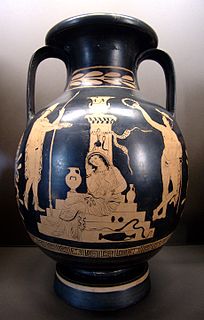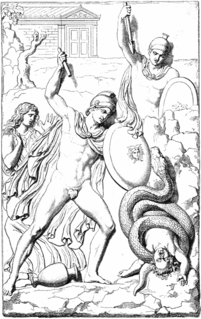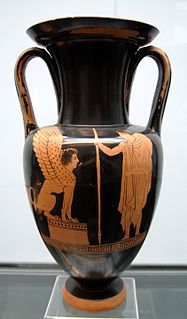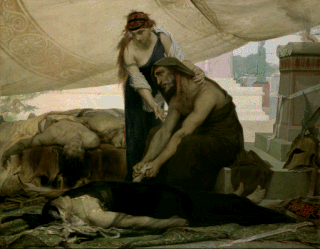 W
WAlcestis is an Athenian tragedy by the ancient Greek playwright Euripides. It was first produced at the City Dionysia festival in 438 BC. Euripides presented it as the final part of a tetralogy of unconnected plays in the competition of tragedies, for which he won second prize; this arrangement was exceptional, as the fourth part was normally a satyr play. Its ambiguous, tragicomic tone—which may be "cheerfully romantic" or "bitterly ironic"—has earned it the label of a "problem play." Alcestis is, possibly excepting the Rhesus, the oldest surviving work by Euripides, although at the time of its first performance he had been producing plays for 17 years.
 W
WAndromache is an Athenian tragedy by Euripides. It dramatises Andromache's life as a slave, years after the events of the Trojan War, and her conflict with her master's new wife, Hermione. The date of its first performance is unknown. Some scholars place the date sometime between 428 and 425 BC. Müller places it between 420 and 417 BC. A Byzantine scholion to the play suggests that its first production was staged outside Athens, though modern scholarship regards this claim as dubious.
 W
WAndromeda is a lost tragedy written by Euripides, based on the myth of Andromeda and first produced in 412 BC, in a trilogy that also included Euripides' Helen. Andromeda may have been the first depiction on stage of a young man falling in love with a woman. The play has been lost; however, a number of fragments are extant. In addition, a number of ancient sources refer to the play, including several references in plays by Aristophanes.
 W
WAntigone is a play by the Attic dramatist Euripides, which is now lost except for a number of fragments. According to Aristophanes of Byzantium, the plot was similar to that of Sophocles' play Antigone, with three differences. The date of the play is uncertain, but there is evidence that it was written late in Euripides' career, between 420 BCE and 406 BCE.
 W
WThe Bacchae is an ancient Greek tragedy, written by the Athenian playwright Euripides during his final years in Macedonia, at the court of Archelaus I of Macedon. It premiered posthumously at the Theatre of Dionysus in 405 BC as part of a tetralogy that also included Iphigeneia at Aulis and Alcmaeon in Corinth, and which Euripides' son or nephew is assumed to have directed. It won first prize in the City Dionysia festival competition.
 W
WChildren of Heracles is an Athenian tragedy by Euripides that was first performed c. 430 BC. It follows the children of Heracles as they seek protection from Eurystheus. It is the first of two surviving tragedies by Euripides where the children of Heracles are suppliants.
 W
WCyclops is an ancient Greek satyr play by Euripides, based closely on an episode from the Odyssey. It would have been the fourth part of a tetralogy presented by Euripides in a dramatic festival in 5th Century BC Athens. The date of its composition is unknown, but it was probably written late in Euripides' career. It is the only complete and extant satyr play.
 W
WEuripides' Electra is a play probably written in the mid 410s BC, likely before 413 BC. It is unclear whether it was first produced before or after Sophocles' version of the Electra story.
 W
WHecuba is a tragedy by Euripides written c. 424 BC. It takes place after the Trojan War, but before the Greeks have departed Troy. The central figure is Hecuba, wife of King Priam, formerly Queen of the now-fallen city. It depicts Hecuba's grief over the death of her daughter Polyxena, and the revenge she takes for the murder of her youngest son Polydorus.
 W
WHelen is a drama by Euripides about Helen, first produced in 412 BC for the Dionysia in a trilogy that also contained Euripides' lost Andromeda. The play has much in common with Iphigenia in Tauris, which is believed to have been performed around the same time period.
 W
WHerakles is an Athenian tragedy by Euripides that was first performed c. 416 BC. While Herakles is in the underworld obtaining Cerberus for one of his labours, his father Amphitryon, wife Megara, and children are sentenced to death in Thebes by Lycus. Herakles arrives in time to save them, though the goddesses Iris and Madness (personified) cause him to kill his wife and children in a frenzy. It is the second of two surviving tragedies by Euripides where the family of Herakles are suppliants. It was first performed at the City Dionysia festival.
 W
WHippolytus is an Ancient Greek tragedy by Euripides, based on the myth of Hippolytus, son of Theseus. The play was first produced for the City Dionysia of Athens in 428 BC and won first prize as part of a trilogy.
 W
WHippolytus is an Ancient Greek tragedy by Euripides, based on the myth of Hippolytus, son of Theseus. The play was first produced for the City Dionysia of Athens in 428 BC and won first prize as part of a trilogy.
 W
WHypsipyle is a partially preserved tragedy by Euripides, about the legend of queen Hypsipyle of Lemnos, daughter of King Thoas. It was one of his last and most elaborate plays. It was performed c. 411–407, along with The Phoenician Women which survives in full, and the lost Antiope.
 W
WIon is an ancient Greek play by Euripides, thought to be written between 414 and 412 BC. It follows the orphan Ion in the discovery of his origins.
 W
WIphigenia in Aulis or Iphigenia at Aulis is the last of the extant works by the playwright Euripides. Written between 408, after Orestes, and 406 BC, the year of Euripides' death, the play was first produced the following year in a trilogy with The Bacchae and Alcmaeon in Corinth by his son or nephew, Euripides the Younger, and won first place at the City Dionysia in Athens.
 W
WIphigenia in Tauris is a drama by the playwright Euripides, written between 414 BC and 412 BC. It has much in common with another of Euripides's plays, Helen, as well as the lost play Andromeda, and is often described as a romance, a melodrama, a tragi-comedy or an escape play.
 W
WOedipus is a play by the 5th-century BCE Athenian dramatist Euripides. The play is now lost except for some fragments. What survives of the play covers similar ground as Sophocles' acclaimed Oedipus Rex, but scholars and historians have found there are significant differences. In Oedipus Rex, the title character blinds himself upon learning his true parentage, accidentally killing his father and marrying his mother Jocasta. In Euripides' play, however, it appears Oedipus is blinded by a servant of his father Laius, Oedipus' predecessor as king of Thebes. Furthermore, Euripides' play implies Oedipus was blinded before it was known that Laius was his father. Also, while in Sophocles' play Jocasta kills herself, remaining fragments of Euripides' play depict Jocasta as having survived and accompanied Oedipus into exile.
 W
WOrestes (408 BCE) is an Ancient Greek play by Euripides that follows the events of Orestes after he had murdered his mother.
 W
WPhiloctetes is a tragedy by the Athenian poet Euripides. It was probably first produced in 431 BCE at the Dionysia in a tetralogy that included the extant Medea and was awarded third prize. It is now lost except for a few fragments. Much of what we know of the plot is from the writings of Dio Chrysostom, who compared the Philoctetes plays of Aeschylus, Euripides and Sophocles and also paraphrased the beginning of Euripides' play.
 W
WThe Phoenician Women is a tragedy by Euripides, based on the same story as Aeschylus' play Seven Against Thebes. It was presented along with the tragedies Hypsipyle and Antiope. With this trilogy, Euripides won the second prize. The title refers to the Greek chorus, which is composed of Phoenician women on their way to Delphi who are trapped in Thebes by the war. Unlike some of Euripides' other plays, the chorus does not play a significant role in the plot, but represents the innocent and neutral people who very often are found in the middle of war situations. Patriotism is a significant theme in the story, as Polynices talks a great deal about his love for the city of Thebes but has brought an army to destroy it; Creon is also forced to make a choice between saving the city and saving the life of his son.
 W
WRhesus is an Athenian tragedy that belongs to the transmitted plays of Euripides. Its authorship has been disputed since antiquity, and the issue has invested modern scholarship since the 17th century when the play's authenticity was challenged, first by Joseph Scaliger and subsequently by others, partly on aesthetic grounds and partly on peculiarities in the play's vocabulary, style and technique. The conventional attribution to Euripides remains controversial.
 W
WThe Suppliants, also called The Suppliant Women, first performed in 423 BC, is an ancient Greek play by Euripides.
 W
WThe Trojan Women, also translated as The Women of Troy, and also known by its transliterated Greek title Troades, is a tragedy by the Greek playwright Euripides. Produced in 415 BC during the Peloponnesian War, it is often considered a commentary on the capture of the Aegean island of Melos and the subsequent slaughter and subjugation of its populace by the Athenians earlier that year (see History of Milos). 415 BC was also the year of the scandalous desecration of the hermai and the Athenians' second expedition to Sicily, events which may also have influenced the author.